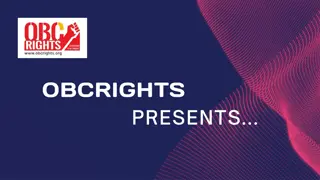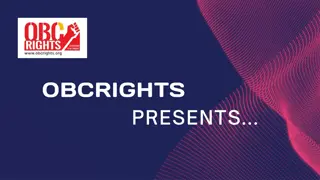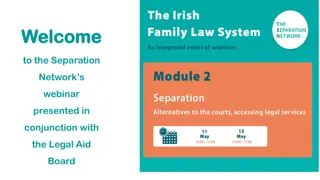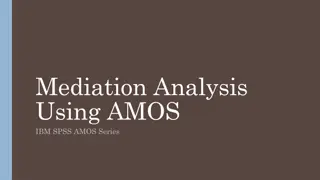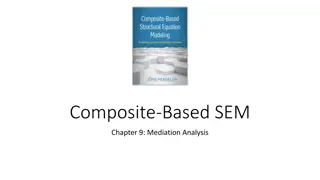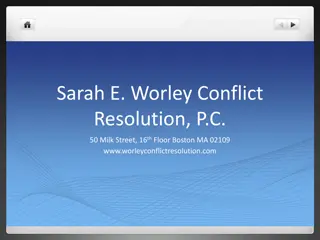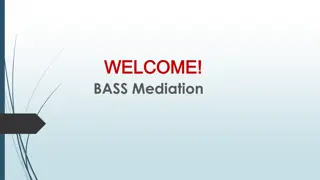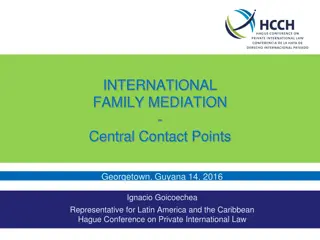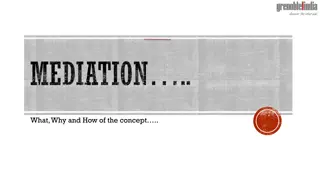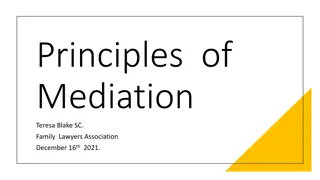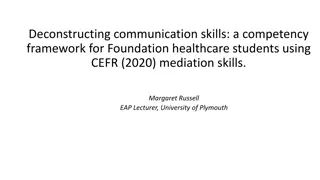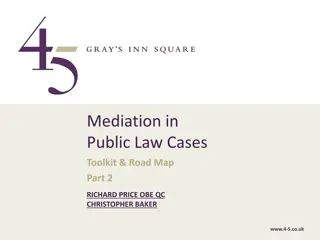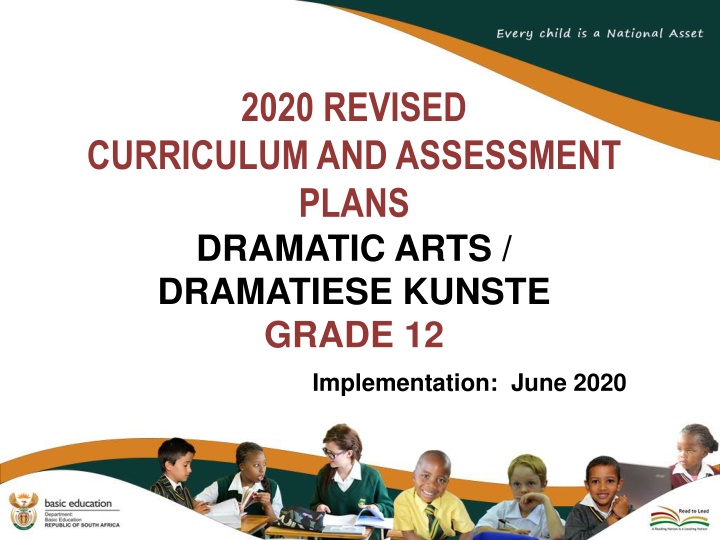
Revised Curriculum and Assessment Plans for Dramatic Arts Grades 10-12 Implementation
These revised plans aim to facilitate the implementation of the trimmed and re-organized 2020 Annual Teaching Plan for Dramatic Arts in Grades 10, 11, and 12, ensuring essential content coverage and effective assessment strategies in the limited time available. Amendments to the content overview and annual teaching plan are detailed, emphasizing the preparation of learners for subsequent academic years.
Download Presentation

Please find below an Image/Link to download the presentation.
The content on the website is provided AS IS for your information and personal use only. It may not be sold, licensed, or shared on other websites without obtaining consent from the author. If you encounter any issues during the download, it is possible that the publisher has removed the file from their server.
You are allowed to download the files provided on this website for personal or commercial use, subject to the condition that they are used lawfully. All files are the property of their respective owners.
The content on the website is provided AS IS for your information and personal use only. It may not be sold, licensed, or shared on other websites without obtaining consent from the author.
E N D
Presentation Transcript
2020 REVISED CURRICULUM AND ASSESSMENT PLANS DRAMATIC ARTS / DRAMATIESE KUNSTE GRADE 12 Implementation: June 2020
Presentation Outline 1.Purpose 2.Amendments to the Content Overview for the Phase; 3.Amendments to the Annual Teaching Plan; 4.Amendments School Based Assessment (SBA) 5.Conclusion
1. Purpose To mediate the amendments of the trimmed and re-organised 2020 Annual Teaching Plan including School Based Assessment for DRAMATIC ARTS, Grades 10, 11 AND 12 for implementation in June 2020 as stipulated in Circular S2 of 2020. To ensure meaningful teaching proceeds during the remaining teaching time as per the revised school calendar. To assist teachers with guided pacing and sequencing of curriculum content and assessment.
1. Purpose (continued) To enable teachers to cover the essential core content /skills in each grade within the available time. To assist teachers with planning for the different forms of assessment. To ensure learners are adequately prepared for the subsequent year/s in terms of content, skills, knowledge, attitudes and values
2. Amendments to the Content Overview for the Phase
Summary: Amendments to the Content Overview for the Phase GRADE 10 GRADE 11 GADE 12 TERM 2 TERM 2 TERM 2 THERE ARE NO AMENDMENTS Topic 2. Theme / Audition/Technical Topic 5. Prescribed Play Text 2 South African Theatre(1960 1994) Topic 6 . A Theatre Post Apartheid Topic 5. Origins of Western Theatre and Greek Theatre Topic 6. Play Text. Greek Theatre Topic 7 Move to Term 3. Nonverbal Communication Topic 8 Move to Term 3 Text Interpretation Topic 4. South African Theatre TERM 3 TERM 3 TERM 3 THERE ARE NO AMENDMENTS Topic 2. Theme / Audition/Technical Topic 7. Prescribed Play Text 3 South African Theatre Contemporary Post Apartheid Topic 8. Revision Topic 7. From Term 2. Nonverbal Communication Topic 8. From Term 2. Text Interpretation Topic 9. Removed from ATP. Medieval/Commedia/Indian Topic 10. Removed from ATP. Play Text for above genre Topic 11. SA. Workshop Theatre Topic 5. SA Theatre. Play Text Topic 6. Physical Theatre Topic 7. Removed from ATP. Stylised Theatre Topic 8. Removed from ATP. Stylised Theatre Play Text Topic 9. Brought forward from Term 4 Director / Designer / Theatre / Film TERM 4 TERM 4 Topic 12. Stage / Film conventions Topic 13. Individual Performance Topic 14. Revision Topic 10. Poor Theatre Topic 11. Practical Work. Preparation Topic 12. Revision
3. Amendments to the Annual Teaching Plan
Summary: Amendments to the Annual Teaching Plan GADE 12 TERM 2 THERE ARE NO AMENDMENTS Topic 2. Theme / Audition/Technical Topic 5. Prescribed Play Text 2 South African Theatre(1960 1994) Topic 6. South African Theatre Post Apartheid TERM 3 THERE ARE NO AMENDMENTS Topic 2. Theme / Audition/Technical Topic 7. Prescribed Play Text 3 South African Theatre Contemporary Post Apartheid Topic 8. Revision
Summary: Reorganisation of the content Topics GADE 12 TERM 2 THERE ARE NO REORGANISATIONS Topic 2. Theme / Audition/Technical Topic 5. Prescribed Play Text 2 South African Theatre(1960 1994) Topic 6. South African Theatre Post Apartheid TERM 3 THERE ARE NO REORGANISATIONS Topic 2. Theme / Audition/Technical Topic 7. Prescribed Play Text 3 South African Theatre Contemporary Post Apartheid Topic 8. Revision
Summary: Amendment to the weighting of content Topics No weightings of any of the Topics were changed
Summary: Content/Topics Amended TOPICS TERM AMENDMENT (Context / Skills / Content) NO CONTENT / TOPICS WERE AMENDED
4. Amendments School Based Assessment (SBA)
Summary: Revised Programme of Assessment TERM 1 TERM 2 TERM 3 TERM 4 TASK 1 Performance Assessment Task 1 (PAT) Written Section Journal (25 marks) Performance Section: Dramatic Item 1 (25 marks) TASK 3 Performance Assessment Task 2 (PAT) Written Section Research / Essay (25 marks) Performance Section: Dramatic Item 2 (25 marks) TASK 5 Performance Assessment Task 3 (PAT) Written Section Research / Essay (25 marks) Performance Section: Dramatic Item 3 (25 marks) TASK 2 Test (50 marks) TASK 6 Test (50 marks) TASK 4 REMOVED FOR 2020 Mid-Year Examination: Written TASK 6 Trial Examination: Written (150 marks) DBE FINAL EXTERNAL NCS.NSC.GRADE 12 EXAMINATION (150 marks) Mid-Year Examination: Performance (150 marks) PAPER 1: Written Examination (150 marks) TASK 7 Trial Examination: Performance (150 marks) DBE FINAL EXTERNAL NCS.NSC.GRADE 12 EXAMINATION PAPER 2: Performance Examination (150 marks)
Summary: Revision Final Examination Structure TERM 4 FINAL NCS.NSC. GRADE 12 END-OF-YEAR EXAMINATION: PAPER 1 WRITTEN SECTION A: Play Text 1: Essay Question (30 marks) SECTION B: Play Text 2: Sub Section Questions (40 marks) SECTION 3: Play Text 3: Sub Section Questions (40 marks) SECTION 4: Theatre History and Practical Skills (40 marks) TOTAL (150 marks) Lower Order = 30% Middle Order = 40% Higher Order = 30% ALL provinces must use Blooms Taxonomy to design and set the Question Paper as well as the Memorandum Support documents Curriculum and Assessment Policy Document (CAPS DBE Approved Textbook Play Texts DBE Examination Guidelines
Summary: Revision Final Examination Structure Content / Concepts / Skills Three Play Texts (two South African, one World): Structure, plot, theme, character, characterisation, relationships, use of language and style in chosen plays Staging techniques, set, use of technical devices, costume/make-up Intent of play, socio-economic/historical context of the play, reception of the play in original context and today Specific devices and conventions related to the genre of the play Theatre History Isms Choice of either Theatre of the Absurd or Epic Theatre or Post-modern Theatre Poor Theatre (from Grade 11) South African Theatre (pre- and post-apartheid) Realism (from Grade 11)
Summary: Revision Final Examination Structure These topics in terms of: Aims of the Dramatic Theatre Movements Background/context: Philosophy, socio-political, religious, economic, artistic, historical and theatrical that informs the Dramatic Theatre Movement Dramatic/staging techniques and other devices used in the Dramatic Theatre Movement, including design elements Stage types used in the Dramatic Theatre Movement Terminology and main concepts of the Dramatic Theatre Movement Examples of Play Texts in each Dramatic Theatre Movement Playwrights and Practitioners Relationship between the Dramatic Theatre Movements: differences, similarities, developments from and reactions to them Evaluation of the Dramatic Theatre Movements: effectiveness and relevance to Theatre and society today
Summary: Revision Final Examination Structure Practical Vocal technique, including posture, breathing, phonation, resonance, articulation and projection Verbal attributes of communication: pace, pause, rhythm, emphasis, pitch, intonation, volume and tone Non-verbal attributes of communication: gesture, posture, movement, facial expression and body language Interpretive and analytical skills to create mood, character and meaning in performance Exercises to improve and develop performance skills, including group dynamics and ensemble performance Knowledge of processes and requirements involved in various dramatic presentations Understanding and application of specific terminology used in dramatic performances
Summary: Revision Final Examination Structure TERM 4 FINAL NCS.NSC GRADE 12 END-OF-YEAR EXAMINATION: PAPER 2. PERFORMANCE DUE TO THE COVID- 19 PHYSICAL DISTANCING LAW: NO GROUP OR PAIR WORK MAY BE DONE ONLY INDIVIDUAL EXAMINATIONS WILL BE ALLOWED THREE OPTIONS: Chose ONE and prepare for the Final Examination 1. AUDITION PROGRAMME: 3 Individual Dramatic Items OR 2. ADAPTED THEME PROGRAMME: 3 Individual Dramatic Items OR 3. TECHNICAL THEATRE PROGRAMME Film Making Design Stage management Directing Provinces may use Dave`s Psycho Motor Taxonomy as a guide to prepare the candidates Dramatic Items and Final Performance Examination Support documents Curriculum and Assessment Policy Document (CAPS DBE Approved Textbook DBE Examination Guidelines Marking Instruments: The rubrics in the CAPS document for Grade 12
Summary: Revision Final Examination Structure TERM 4 FINAL NCS.NSC GRADE 12 END-OF-YEAR EXAMINATION: PAPER 2. PERFORMANCE - CONTINUE DUE TO THE COVID- 19 PHYSICAL DISTANCING LAW: NO GROUP OR PAIR WORK MAY BE DONE ONLY INDIVIDUAL EXAMINATIONS WILL BE ALLOWED The three Items must be CONTRASTING IN: GENRES / DRAMATIC MOVEMENTS and must present a VARIETY IN STYLE: CAPS mandated Topics to master: Grade 10 12: Vocal, Physical, Text and Acting Topics Grade 10. Topic 13 Grade 11. Topic 11 Grade 12. Topic 2 running over three terms Genres and Dramatic Movements: African Drama Forms / Commedia dell Arte / Greek Theatre / South African Theatre / Realistic Theatre / Elizabethan Theatre / Epic Theatre / Poor Theatre / Theatre of the Absurd / Post Modern Theatre Format of the Adapted Theme and Audition programmes Dramatic Items: 1. 1 Individual Dramatic Item + 2. 1 Link + 3. 1 Individual Dramatic Item + 4. 1 Link + 5. 1 Individual Dramatic Item (Optional: solo movement item may replace one of the individual items above ) Dramatic Styles E.G.: Poem /monologue/ prose / praise poem / dramatised prose / storytelling / mime /physical theatre/musical theatre TIME ALLOCATION FOR EACH LEARNER IS 3-5 MINUTES PER LEARNER
Summary: Revision Final Examination Structure TERM 4 FINAL NCS.NSC GRADE 12 END-OF-YEAR EXAMINATION: PAPER 2. PERFORMANCE - CONTINUE DUE TO THE COVID- 19 PHYSICAL DISTANCING LAW: NO GROUP OR PAIR WORK MAY BE DONE ONLY INDIVIDUAL EXAMINATIONS WILL BE ALLOWED THE FINAL END-OF-YEAR EXAMINATION WILL BE PERFORMED LIVE AND RECORDED ON A CELLPHONE. The provincial leaders for the subject; DCES, if there is no DCES the SES/ SA, must: Create a main folder within the Cloud Storage Platform (Drop Box, One Drive, Google Drive , etc.) preferred by the Province s Education Department. Title the folder: CAPS. NCS. NSC. Grade 12. Paper 2. Performance Examination. 2020 Send the link of the main folder to all the teachers Create sub folders. Each school will have its own sub folder. Title each subfolder as follows :Dramatic Arts. Paper 2. Examination. (School s Name). 2020 As soon as possible communicate to the teachers to: Become familiar with their province s Cloud Sharing Platform s operations and management Instruct learners to prepare an Audition Programme or ADAPTED Theme Programme (the Programme), comprising three Individual Items and two Links. Ensure the learners Programmes are recorded and sent electronically (e.g., email/WhatsApp) to the teachers three days prior to the day of the Examination, with each learner s name surname and school announced before their performance. Ensure they have received every candidate s Programme clip on the day of the scheduled Examination. Send a list of each candidate s surname, name and examination number to SES/SA and Markers. Upload each candidate s Audition Programme clip on the main folder on the Cloud Storage Platform Immediately after uploading the individual Programmes, inform their province s DCES / SES / SA that they have uploaded the Examination Evidence.
Summary: Revision Final Examination Structure TERM 4 FINAL NCS.NSC GRADE 12 END-OF-YEAR EXAMINATION: PAPER 2. PERFORMANCE - CONTINUE DUE TO THE COVID- 19 PHYSICAL DISTANCING LAW: NO GROUP OR PAIR WORK MAY BE DONE. ONLY INDIVIDUAL EXAMINATIONS WILL BE ALLOWED. THE FINAL END-OF-YEAR EXAMINATION WILL BE PERFORMED LIVE AND RECORDED ON A CELLPHONE. Marking will be done virtually The relevant Provinces must advertise for and make appointments of Paper 2 markers, as is done annually. The DCES/SES/SA will give the appointed markers access to the Cloud Storage Platform. The markers will meet through the relevant Province s preferred Digital Meeting Platform (e.g.: Microsoft Teams), to mark each school s respective learners Audition programmes OR Adapted Theme Programme (hereafter, the Programme). The CAPS Rubrics will be used to mark each learner s evidence. Marks will be awarded and captured on a mark-sheet provided to the markers by the DCES / SES / SA of the province. Once a school s marking is finalized, the markers will email the marks to the DCES / SES / SA, who will verify and submit these marks to the Provincial Examinations Department. The DCES / SES / SA of each province must, as soon as possible, draw up an Examination schedule for all the schools Examinations. The DCES / SES / SA in the capacity of Moderator must moderate 10% of the candidates Examinations. The annual Moderation, Quality Assurance and Statistical Moderation policies, principles and processes must be applied. NOTE: In terms of the recording of the Programme: Markers will not mark the quality etc. of the video clip The only imperative is learners must be clearly seen and heard Learners must film against a neutral and light background with as little as possible excess furniture in the space Learners must not record in front of a window where the light is behind them The camera frame must record the whole body of the learner: head, shoulders and feet there may not be any close-ups The recording itself must be set up as a static frame, no zooming in or out Acting must be stage acting; NOT film or television acting There may be no added sound effects, filters, special effects or edits to the clip The candidates must adhere to the CAPS dress code: hair out of their faces, no jewellery, black T-shirt and pants .
Summary: Revised Practical Assessment Task (PAT) TERM 1 TERM 2 TERM 3 TERM 4 TASK 1 Performance Assessment Task 1 (PAT) Written Section Journal Research / Essay (25 marks) Performance Section: Dramatic Item 1 (25 marks) TASK 2 Performance Assessment Task 2 (PAT) Written Section Journal Research / Essay (25 marks) Performance Section: Dramatic Item 2 (25 marks) TASK 5 Performance Assessment Task 3 (PAT) Written Section Journal Research / Essay (25 marks) Performance Section: Dramatic Item 3 (25 marks) ALL THREE PERFORMANCE ASSESSMENT TASKS PATS REMAIN AS IS NO AMENDMENTS WERE EFFECTED
Contact Details Name: CES: Subjects Department of Basic Education Tel: Email:

